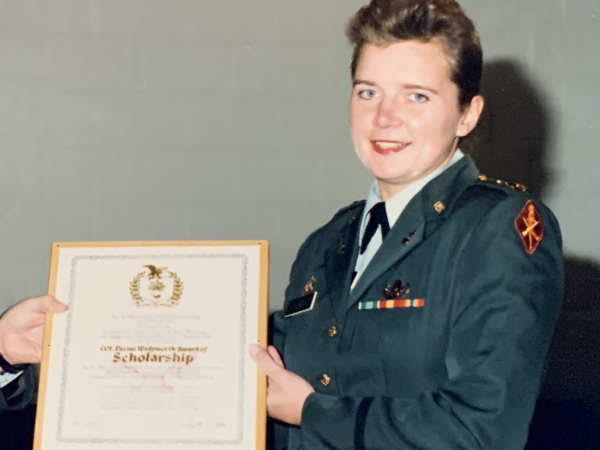
How did you get into project management?
I was doing business case/analysis of alternatives work for large U.S. Department of Defense (DoD) IT projects, and the scope of my work later expanded to a more general focus on project management. The DoD has very detailed guidance on how to run large projects, so I learned a lot about structure and discipline that I later used to help run some of the largest projects in the world. I worked on enterprise resource planning (ERP) projects for the DoD—they were like installing M-Pathways but on a much bigger scale. In the beginning of my career with the DoD, I provided support to the primary project manager for any given project. When DoD IT started to follow the same processes, I helped make sure IT projects followed DoD standards.
You served in the military. Tell us about that.
My military career began when I entered West Point, I was in the seventh class of women to graduate in 1986. As a minority (women were only about 10% of the corps), you were always noticed—when you did well, and when you didn’t. It was hard to blend in because there were so few of us. But I always had a lot of self-confidence and never questioned my ability to succeed there.
There is also a certain camaraderie in being part of a class of students who are all treated the same—the plebe year (first year) is pretty intense. It’s an immediate bond that makes it easier to be at school or in the military, and to stay connected even if you haven’t seen each other in a while. To this day, I meet up with the women in my class every year.
Fun side note: I was also on the gymnastics team at West Point, and our spotters were on the power lifting team. Spotters are important because they help keep the gymnasts safe during difficult and dangerous moves on equipment like the uneven bars. The spotters suggested that I join the powerlifting team. It looked fun, so I tried it. I went to the first meet, broke two New York records, and qualified for nationals. I was an NCAA All-American for two years, but then I dislocated my elbow in my senior year. That was an unfortunate end to my athletic career.
I then went to Ordnance officer basic school in Huntsville, Alabama, and then to Explosive Ordnance Disposal (EOD) school (also known as the “bomb squad”) in Indian Head, Md. I really loved “bomb squad” school, as it was affectionately known. I liked that I got to do hands-on, challenging work, and blowing up stuff is fun. We were on call to help local police departments diffuse bombs. I spent four years in Tacoma, Wash., as the Executive Officer and Commander of the EOD unit at Fort Lewis.
I retired from the military in 2014. I had 28 years total in the military at that time (11 active duty, and 17 reserve).
How do you think your time in the military impacts your work today?
The military expanded my world view. I lived in many parts of the U.S. and overseas, and I worked with a wide variety of people. All of this together allows me to be flexible and adaptable to situations. Further, bomb disposal helps you quickly prioritize and understand what is really important (i.e., life and death).
I also worked on recruiting for West Point. I understood the admissions process, and I recalled my own experience where the recruiter didn’t prepare me for what was to come. But that ended up serving me well because I became quite adept at reaction and change, and understanding the environment and context.
What advice would you give to employers who are considering hiring veterans?
Veterans have leadership, decision making skills, and maturity you will not typically find in their peers. The military teaches and gives you responsibility very early in your career. You also learn what it means to be a member of a squad (or team).
What do you enjoy most about your job?
I like the variety and challenge of project management. I am always working with new people and new problems. I enjoy learning new things. I have had the opportunity to work on our TeamDynamix (TDx) data migration project, COVID applications, Michigan Medicine supply chain, and Digital Accessibility, all of which I found very interesting and fantastic learning opportunities while supporting the university.
What do you do for fun?
I enjoy singing lead with my Sweet Adelines chorus, a barbershop-style a capella group. I also like yard work and gardening, home improvement tasks, and traveling to our cabin near Port Austin, Mich.
